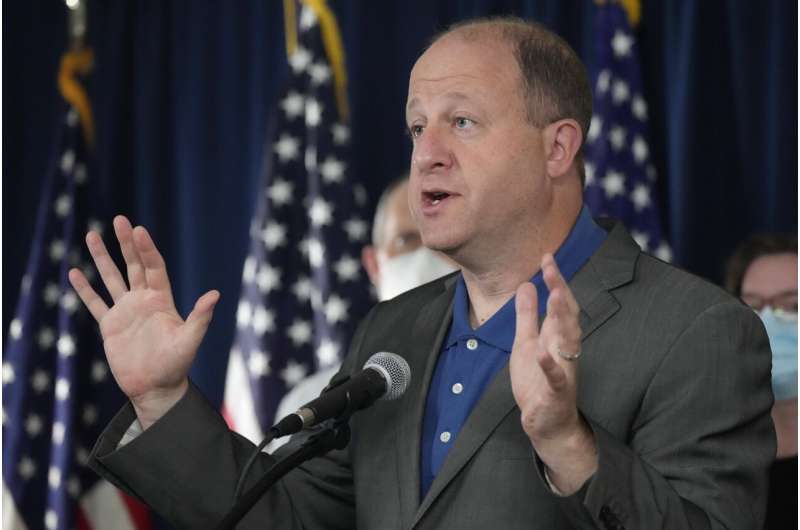
Facing a surge in coronavirus infections that threatens to overwhelm Colorado hospitals, Gov. Jared Polis defied federal guidance on COVID-19 booster shots Thursday by issuing an order allowing all state residents 18 and older to get them.
U.S. Food and Drug Administration rules allow booster shots for those 18 and over who are at high risk of exposure to the virus. The FDA also permits boosters for people 65 and older, and adults with special medical conditions. Polis’ order declares all of Colorado at high risk of infection, significantly expanding the number of residents eligible.
“Because disease spread is so significant across Colorado, all Coloradans who are 18 years of age and older are at high risk and qualify for a booster shot,” the Democratic governor said in his order.
Requests for comment from the FDA were not immediately returned on Thursday, a federal holiday.
But at a White House briefing on Wednesday, Dr. Rochelle Walensky, director of the U.S. Centers for Disease Control and Prevention, emphasized the importance of getting boosters to those already eligible under the federal guidelines. She also stressed the importance of vaccinating children ages 5-11.
“As you likely know, FDA is currently looking at the data for expanding boosters to all populations,” Walensky said.
Pfizer asked U.S. regulators Tuesday to allow boosters of its COVID-19 vaccine for anyone 18 or older, a step that comes amid concern about increased spread of the coronavirus with holiday travel and gatherings.
The Biden administration had originally envisioned boosters for all adults, but FDA scientific advisers in September rejected extra Pfizer doses for everyone. The panel wasn’t convinced that young healthy people needed another dose and instead recommended boosters just for certain groups.
People who are fully vaccinated are still strongly protected against hospitalization and death from COVID-19. But immunity against infection can wane over time, and the extra-contagious delta variant is spreading widely. U.S. health authorities want to shore up protection in at-risk people who were vaccinated months ago, though they emphasize that the priority remains getting the unvaccinated their first shots.
Polis has emphasized vaccinations as a top tool in fighting the latest surge that officials worry could overwhelm the state’s hospital capacity by the end of the year. He’s also expressed frustration in the past with the federal government’s authorization of vaccines and their distribution.
“The Governor has been disappointed with the overly complex message from the CDC and the FDA on boosters and won’t allow that to harm Coloradans who want the additional protection,” Polis spokesman Conor Cahill said Thursday. “The Governor is confident that this clarification is well within the guidance of the CDC and FDA.”
Polis’ order allows vaccine providers to give booster shots to everyone who received the double-dose Pfizer or Moderna vaccines at least six months ago. People who received the single-dose Johnson & Johnson vaccine, which hasn’t proven as effective as its competitors, can get a booster at least two months later. Anyone eligible for a booster doesn’t have to stick with their initial vaccination type and can get a different company’s vaccine.
About 62% of Colorado residents are fully vaccinated, putting the Rocky Mountain state above the national average and among the top 15 for states with the highest vaccination rate.
Yet Colorado had the seventh-highest COVID-19 diagnosis rate in the country over the last week, with 1 in every 259 people getting the virus, according to John Hopkins University data compiled by The Associated Press. Cases, hospitalizations and deaths have all been on the rise for weeks.
About 1,426 COVID-19 patients are hospitalized in Colorado, and State Epidemiologist Dr. Rachel Herlihy said Wednesday the state could hit 2,258 COVID-19 hospitalizations by Jan. 1, a record high for the pandemic.
The delta variant surge combined with hospital staffing shortages has left about 720 total beds available in intensive care and acute care units, according to the Colorado Hospital Association. Some 17% of all beds are occupied by those with COVID or suspected of having it, the state health department said.
Polis put the number of available hospital beds at 623 in his order, and he has repeatedly emphasized that the unvaccinated—28% of state residents, according to state data—account for 80% those hospitalized. Officials said many of the remainder are immunocompromised or older patients more susceptible to the virus.
“With an estimated 1 in 67 Coloradans infected, it is likely that nearly all Coloradans are exposed to COVID-19 where they live or work,” the governor said in his order. “I declare the entire State of Colorado high risk for exposure or transmission of COVID19 and therefore eligible for the safe and highly effective COVID-19 booster shot.”
Colorado’s seven-day positivity rate—the percentage of people testing positive for the virus out of all who have been tested—reached 9.93% as of Wednesday.
That means for every 100 people tested over that week, nearly 10 of them tested positive. Last year, the highest seven-day positivity rate was 11.21% as of Nov. 20.
More than 700,000 Colorado residents are known to have been infected during the pandemic, and 8,814 people have died.
James Anderson

